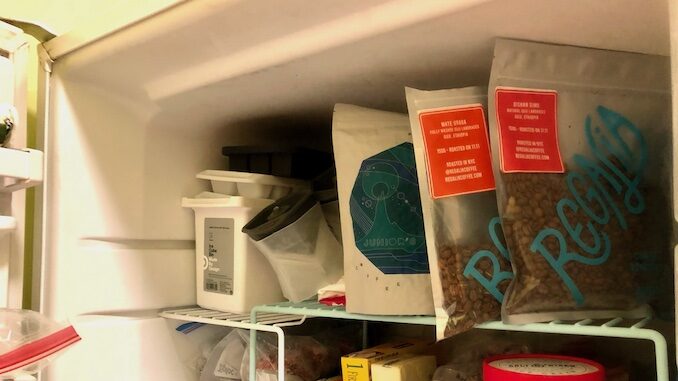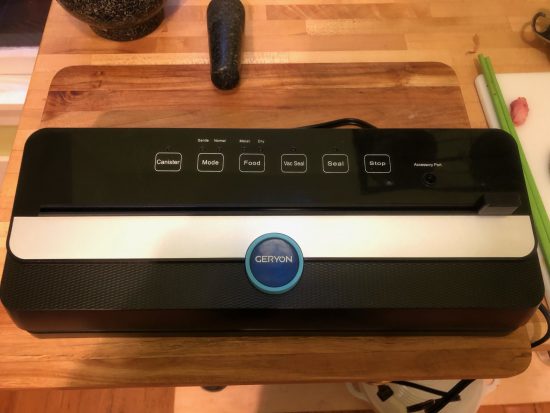
Today’s coffee storage methods are flipping everything that we knew about coffee in 2015 on its head.
BY KATRINA YENTCH
BARISTA MAGAZINE ONLINE
Photos by Katrina Yentch
“Grind fresh! Leave beans in the dark, and pay attention to your roast dates!” the coffee demigods of 2015 told us, ingraining strict protocols for brewing and storing beans at home. As the industry later changed philosophies to making specialty coffee as accessible as possible, it became more lenient on coffee preparation. And one of those ways was by digging into a practice that was once considered taboo: storing coffee grounds in the freezer.
We’ve Been Freezing Specialty Coffee for A While Now
GASP! was all 2015 could say about that. And yet, other early coffee minds could see a future beyond these protocols, already testing what coffee could offer while kept frozen. A study that coffee scientist Chris Hendon worked on in 2016 explored the possibilities of grinding frozen coffee, and specialty pioneer George Howell had already been freezing green coffee for years. However, this still was met with much skepticism until years later.
That Moment When Proud Mary Started Freezing Their Hoppers
In 2020, we witnessed more forward-thinking specialty roasters like Proud Mary in Australia embrace frozen coffee on both the green and roasted ends of the supply chain. In addition to keeping green coffee stored in vacuum-sealed bags in freezers, Proud Mary has also fashioned a freezer specific to espresso hoppers. Drilling holes in the bottom of the freezer, these hoppers stay in them, remaining icy throughout the entirety of a service period—meaning baristas are freshly grinding frozen beans for every shot. According to co-founder Nolan Hirte, grinding frozen allows for more uniform extraction, less frequent changes in dial-ins, and higher extractions because of how many particles the coffee can be ground into.
Regalia Roasters Makes Freezer-Friendly Coffee Bags
Another roaster that has embraced frozen coffee is Regalia Roasters in New York City. A recent change in branding and design resulted in a new retail bag that customers receive in the mail whenever they order coffee. Called Flat Paks, the valve-free packages allow others to store these in the freezer, plus reduce shipping costs. In an article from Barista Magazine’s June + July 2021 issue, Paolo Maliksi explains the change to us. “Last summer, I had read an interesting piece by Jonathan Gagné on his blog Coffee ad Astra about storing roasted coffee in the freezer for medium to long-term use. This resonated with me, as we are starting to see more customers store some of their favorite coffees over longer periods of time.“

How Vacuum Seals “Burned“ Freezer Skeptics
While many coffee people pick up trends and embrace new practices at different times, I personally did not start to take much notice of frozen coffee until the folks at Alliance for Coffee Excellence gifted me samples last summer. They came in vacuum-sealed plastic packs. I later learned that this had been implemented to avoid the “freezer burn“ that skeptics of frozen coffee commonly argue about. These packs, however, not only prevent this from happening; they remove any kind of oxygen that can enter the bag and cause aging.
And then, as a culinary enthusiast, I also came to the conclusion that freezers are dehydrating. That’s why we put certain foods in freezers: because it’s the water that will cause certain foods to spoil. In which case, why can’t the same be true for coffee?
More Freeze Is Less Waste
And further, why waste good coffee? Every year in specialty coffee, we continue to place environmental sustainability as one of the pillars of our ethos. Freezing coffee allows us to store it as long as possible, and henceforth create minimal waste by doing so.
How to Freeze Your Coffee
With all that being said, why not give it a shot? A quick and easy way to do this is to vacuum seal your whole bean coffee and toss it in the freezer. I personally like to “defrost“ my coffee the night before I’m going to use it, mostly because I think that commercial grinders can handle frozen beans better than my grinder can. Or, if you don’t have a vacuum sealer, simply put any bags of beans that you won’t use for a while in your freezer.
For a more thorough breakdown of frozen coffee storage, you can check out this video here.

